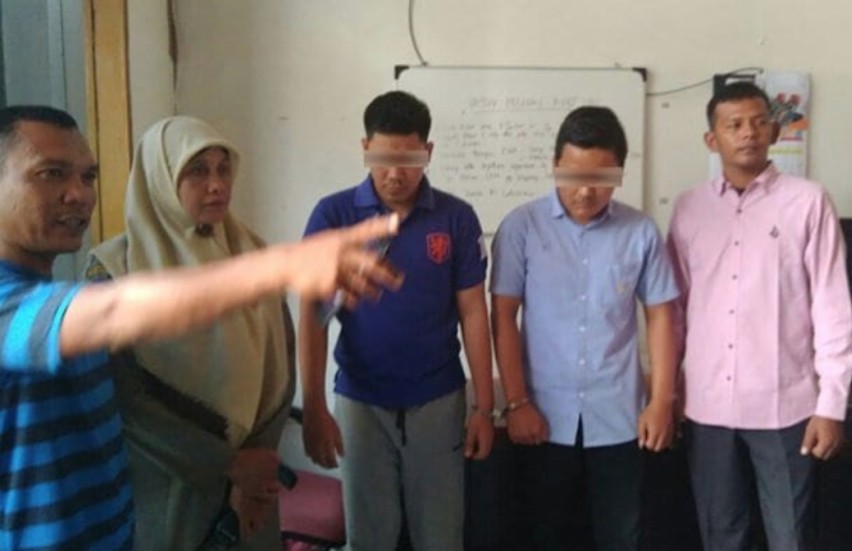The two men arrested by vigilantes in Aceh on suspicion of being gay. | Photo: Instagram/Muhamad Nasir via @kabaraaceh
Vigilantes have once again raided the private residence of people they suspect to be LGBTI in Indonesia.
Last week, the vigilantes raided a boarding house where the two men were spending time together. The mob arrested them because they thought they were gay and then handed them over to police.
This latest in a long list of raids carried by vigilantes happened in Indonesia’s Aceh province. It is the only province allowed to rule with Islamic Sharia Law in Indonesia.
Introduced in 2014, Qanun Jinayat is a strict Islamic Sharia Law code unique to the Aceh province. Aceh is the only Indonesian province that can legally adopt by-laws derived from Sharia due to a ‘Special Status’ agreement brokered in 1999. Essentially, the Indonesian government allowed Aceh the Special Status to calm its desires during negotiations to become an independent state.
Last year, Aceh became the first place in Indonesia to arrest and convict two men for homosexuality. The students were caned 82 times in a public square.
The latest men arrested were charged under Article 63 of the 2014 Islamic Criminal Code, the anti-homosexuality law. They face a penalty of 100 lashes if convicted.
It takes up to two months to process these charges and convictions in Aceh, which means the pair could face the caning as early as next month.
The latest arrests bring the total of four LGBTI people in police custody in Aceh. In mid-March vigilantes rounded up a trans woman and man were from a beauty salon. Police also charged them with Article 63 of the Islamic Criminal Code.
LGBTI people laying low or trying to escape
The LGBTI community along with religious minorities and women have been the targets of a brutal crackdown in Indonesia over the past couple of years.
The crackdown has been felt most strongly in Aceh, a very conservative religious province.
LGBTI advocacy groups have helped to transport people out of the region to Medan in North Sumatra or the capital, Jakarta. Once they have escaped the organizations provide them with shelter, job training, counselling and food.
But as the numbers grow the organizations are struggling to keep up with the demand, according to Indonesian researcher for Human Rights Watch (HRW), Andreas Harsono.
‘Aceh is the worst… all of Aceh is becoming a police state’ he told Gay Star News.
‘The Jakarta and Medan LGBT groups are asking for money. The number of victims is growing. Everyone’s chipping in money.’
Harsono himself once drove six LGBT people to safety from Aceh to Jakarta. He said the fear of persecution and need to leave Aceh has a devastating impact on people.
‘I met with two young lesbian women, one was 20 when she was arrested in 2015. Her parents asked her politely not to come back (to Aceh) because it’s not safe,’ he said.
The two women lost education opportunities because of their arrest. One missed out on a place at university and the other dropped out of her college course.
Like many other persecuted LGBTI people the women are traumatized and miss their families greatly.
Aceh’s trans women
An LGBTI activists in Aceh who is sheltering formerly arrested trans women said the province’s 600-700 are ‘lying very low’ to avoid vigilante raids.
Earlier this year Aceh police forcibly shaved the heads of detained trans women in a public square. Police released them only on the condition they ‘live like men’.
Harsono said it was time the Indonesian government did something to protect LGBTI people, especially if it would continue to allow Aceh to rule with Sharia Law.
‘The Indonesian government should do something to protect these individuals. Transgenders are especially often targeted due to their physical appearances,’ he said.
‘The government at least should provide shelter in Medan, North Sumatra, providing them with training and later job, if the national government cannot revoke the discriminatory regulations in Aceh.’







